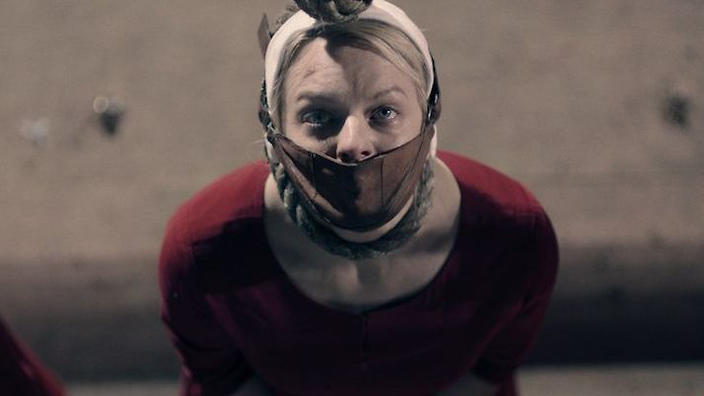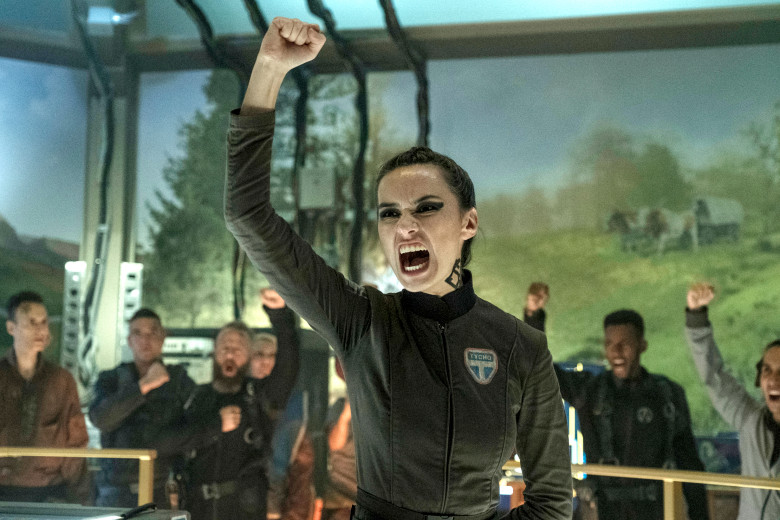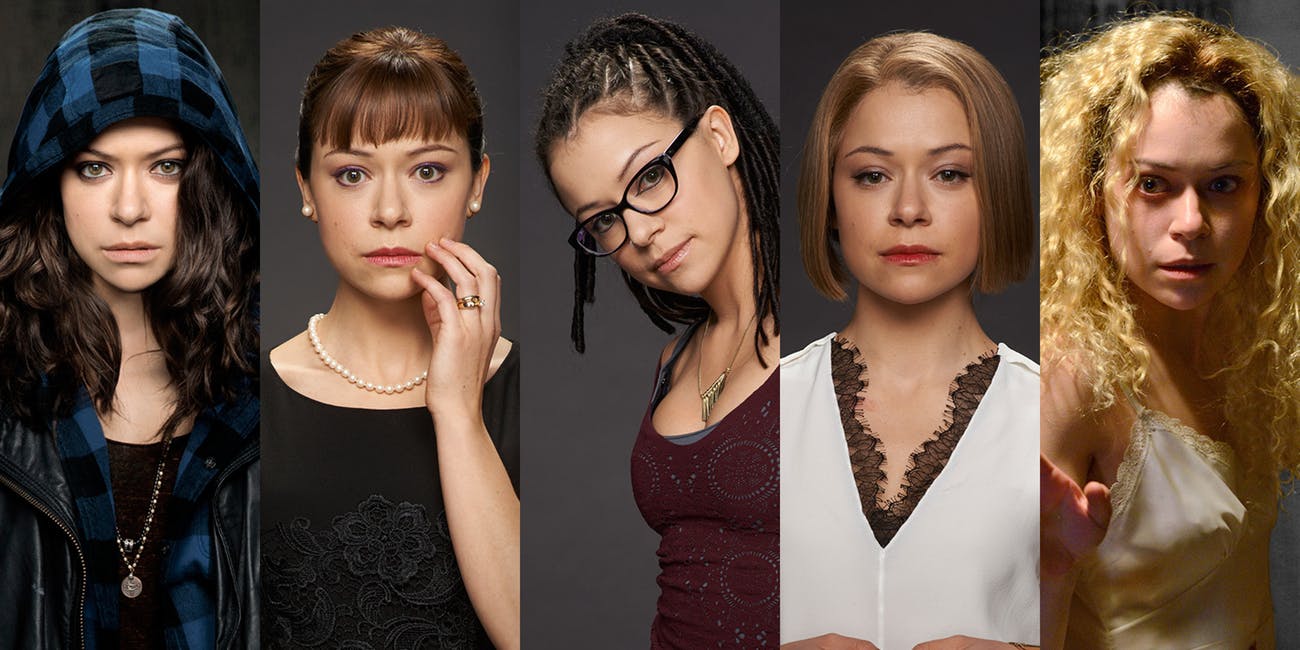The Handmaid’s Tale
The Emmy Award winning (the first for a streaming service) The Handmaid’s Tale is one of the most important TV dramas since The Wire. It has just finished it second season
Based on the 1985 novel by Margret Atwood of the same name. The Handmaid’s Tale is a dystopian drama set in near future America where fertility rates have collapsed and a Christian fundamentalist group have taken rule of the US. Under this totalitarian regime women are not allowed to work, hold money or read. The few fertile women are forcibly taken as “handmaids”. The Handmaids are assigned to the elite of the Gilead regime and are raped by their masters in order to bear children for them and their wives
Told through the eyes of Jane (renamed Offred) played brilliantly by Elisabeth Moss (for which she also won an Emmy) she is assigned to the home of Gilead commander Fred Waterford. The show switches between her life as a Handmaid as well as a series of flashbacks to her life as Gilead began to take over, being on the run with her family and her capture, and enslavement.
Despite its future / near future setting The Handmaids Tale uses clever product design to give you into a false sense that this could possibly be 100 of years in the past then gives you a stark reminder by then showing you modern day cars and guards with machine guns.
The Handmaid’s Tale throws you into the nightmares and horrors of what is happening in the oppression of women all over the world – bringing it into one place. Women are being forced into sexual slavery (including the western world which many forget). In Saudi Arabia women are only now being allowed to drive and recently a woman was arrested there for wearing a miniskirt.

We are living in the Trump era and the times of right wing fundamentalism. The separation between church and state is closing. This can be seen in abortion rights being reduced in many states (there has been some good with Ireland repealing the 8th amendment) and the US becoming more totalitarian where people are willing to give up freedoms for a sense of security.
What The Handmaid’s Tale does so well is bring to you a realness and relatability of real world issues. It’s an abstraction of the real world today that could easily happen and is happening. Resulting the show has become a part of our culture – just look at the protests against the abortion bill in Ohio where the protesters dressed as Handmaids. This is the power of dystopian TV
It got me thinking are there any other dystopian TV shows that also give us a vision of future / alternative realities of our society that we could learn from?
Before we looking to other shows it would be good to look into a definition of what dystopia actually is:
Dystopia – an imagined place or state in which everything is unpleasant or bad, typically a totalitarian or environmentally degraded one.
There is a wealth of dystopian dramas which like The Handmaids Tale bring a vision of the future / present (and sometimes the past) that bring forth moral, social, economic and environmental questions about our society and its possibilities that we could learn from
This is my guide to the dystopian shows to watch now that The Handmaids Tale is over
3%
This Brazilian Netflix dystopian science fiction is a story of the divides of racial and social class that plague society today.
3% is set in a future where Brazil is divided between the mainland slums where 97% live in of crime, poverty the elite inhabit an island paradise far from the crowded slums. Away from the overpopulation and struggle the 3% elite reign on an offshore island utopia. Once people on the mainland reach the age of 20 they are able to go through “the process”, a series of tests from which the best are chosen to join the 3% on the offshore whilst the remaining are sent back into the slums
This is a story of social divide and an extrapolation of societies today. In Brazil many say that there’s no true middle class, just the lower and upper. In the future of 3% we see the stark consequences of the extreme class division and the consequences of the rich elites benefitting whilst the poor are left in squalor. The show can not only be seen as an abstraction of the class divisions in Brazil but you could take it and look at class divisions within boroughs on our shores – just look at Kensington & Chelsea for example and the stark class differences which became more apparent in the wake of the Grenfell Tower fire
Season 2 of 3% is out now on Netflix
Black Mirror
You can’t talk about dystopian series that are a reflection on society without talking about Black Mirror – the Twilight Zone of our generation.
Spanning 4 (soon to be 5) seasons between Channel 4 and now Netflix this Charlie Brooker dystopian drama hits very close to home with every episode. Each episode is a social commentary of the life today in the technological age.
The power of Black Mirror is its ability to make us look at the things we take for granted in this new technological age and make us self reflect as to how deeply disturbing and dangerous they can actually be
Black Mirror extrapolates our relationship to technology and the role it plays in our society without feeling too far fetched. All the scenarios seem real
Black Mirror covers issues like are merit based social media society, information consent, the roles of technology in elections which is quite poignant following the Cambridge Analytica scandal, augmented reality and much more. It lets us see our society in dangerous ways.
Cleverman
This Australian near future dystopian drama deals with race and injustice. An ancient indigenous species called Hairypeople find themselves persecuted and exploited by the goverment. Branded ‘subhumans’ they are forced to live separately in a ‘The Zone’, where they find some solidarity with their few human neighbours
The treatment of the hairypeople in this show highlights the treatment that indigenous Australian aboriginals faced in Australia. Seen as less than human, the racism they receive, having their land rights taken away, tortured, having their culture destroyed and placed into zones away from the rest of the population.
Cleverman is a story of ostrocised communities. As well as aboriginals Cleverman also parallels the treatment of any marginalised community whether it’s American Indians, people in refugee camps across Europe and the world, and asylum seekers.
Despite its future setting and the presence of mythical creatures Cleverman is incredibly present and thought provoking. It’s also great having a show with First Nations Australians in lead roles
The Expanse
This dystopian science fiction is set hundreds of years in the future but parallels the political and economic systems of today. Based on the James S. A. Corey novels of the same name it is set in a solar system where humans have colonised the solar system. The Expanse chronicles the power struggles between an overpopulated earth, the technological power of Mars and on the fringes of society the Belters of the outer planets who struggle under poverty.
The Expanse has multiple themes, but its main premise follows a police detective in the asteroid belt, the first officer of an interplanetary ice freighter and an earth-bound United Nations executive slowly discover a vast conspiracy that threatens the Earth’s rebellious colony on the asteroid belt. But underneath this is a story of divide that is very prescient today. The Earthers, Martians and Belters see each other as different species in a sense despite all being human.
A struggling Earth trying to put itself first. The technological powerhouse of Mars who are further expanding across the solar system and are at possible war with Earth. The outer planet Belters who were the original asteroid miners who have been long forgotten and marginalised on the outer reaches of the solar system, some of whom have become radicalised.
The Expanse has social class at its underlying nature. One thing that becomes very obvious and amazing about the show is how multicultural and gender balanced the protagonists of the show are. Diversity is a big part of the show and women and people of colour take positions in a show which would normally be taken by white men and this is refreshing.

The Expanse is also a story between Mars, Earth and the Belt that is not based around skin colour making the apparent differences between these nations not so clear
As social divide in our nations are growing, a show like The Expanse shows us how people who look alike that turn enemies. The Expanse parallels Trump’s America in many ways. Authoritaranism, radicalisation, power struggle, marginalisation, war, terrorism, refugees and closed borders, The Expanse is so relevant for a show set 300 years in the future. Add on to that it’s a damn great scifi show
The third season of The Expanse is out on SyFy now
Colony
Colony tells a story of a family’s fight to stay together in the wake of an alien invasion which has left the planet under authoritarian rule.
Colony highlights our current fears about being ruled and injects them into the reality of an alien invasion. It doesn’t deal with all the common tropes of other alien invasion thrillers. Rather than focusing on the invasion itself the show concentrates on the struggles of the population under the alien rule. People are living under authoritarian rule but from an enemy we cannot see, military on the streets, check points, ID checks, martial law, curfews, everything and everyone being monitored.
So much of this show is parable to a country that has been overtaken by an invading force and what the people have to go through when they are supposedly “free”. The aliens also build a huge wall around Los Angeles.
Another interesting thing about the show is that at the time of the invasion all military, police, government were taken out by the aliens other than those they recruited to rule the rest of the populous and let live in high luxury. The remaining populous are left in the city to fend for themselves in comparable poverty with no cars and having to swap food. Like 3% there is no middle class
Colony brings up questions that many other films and books have asked before of being under an invading force as well as those of class. At the same time it’s an entertaining traditional sci-fi invasion thriller
Now in its 3rd season (without giving any spoilers) the show goes in themes of a population being ruled when it believes it is actually free. It’s a good watch. Hopefully the rumours of it not being renewed for a fourth season aren’t true
The Man in the High Castle
Alternative history shows have been a hot topic recently. There has been much press about HBO’s forthcoming Confederacy – https://www.theguardian.com/tv-and-radio/2017/aug/01/confederate-hbo-game-of-thrones-benioff-weiss-racism. Another show to show alternative histories is The Man in the High Castle. Based on the Philip K. Dick novel of the same name is set in 1962 America where the Axis powers have won World War II and divided the United States into the Greater Nazi Reich and the Japanese Pacific States.
The show reflects present day America in so many ways. It lets you see an America where fascism has taken over. The rise of far right groups and increase in censorship and proposed control of the media the show has many parallels to the world today. Taking away whether it’s a about being taken over by fascists in this show or aliens in Colony, what this is about is what are we what goes on in our own gates and what we as a society are willing to take from our rule – imposed or not. That’s what shows like Man In The High Castle will make you question
Orphan Black
This Canadian sci-fi thriller starts as a tale of a con artist called Sarah witnessing the suicide of what turns out to be her doppelganger and goes down a rabbit hole of themes such as generic rights, cloning, identity, fertility, religious cults, technology and a whole more.
Highly entertaining and brilliantly acted by Tatiana Maslany plays up to 8 clones in the episodes. As the plot unfolds we get an insight into what a genetic engineering and cloning capable society could do – in the age of CRISPR it shows some very old age selective breeding and eugenics like programs in operation. Like Handmaids Tale it also delves into female reproductive rights and fertility. Identity and social class are also themes looked at in the show with the various clones being identical but raised differently also opening up questions of the nature vs nurture debate.
Like The Handmaid’s Tale Orphan Black excels in portraying strong female characters. As well as the wildly different clones all played by Tatiana Maslany in her Emmy winning performance, there are also many positive identity types across the clones from straight, lesbian and trans. There are also female characters across STEM positions and the character Siobhan who plays a strong character not seen in many shows (without giving away too much). The show has been responsible for getting more young women into STEM and has also become a part of popular culture as seen with the social media led Clone Club

The titles of the episodes give an insight into the rabbit hole of ideas the series brings – each season of which is taken from a different writer. The first season titles came from Charles Darwin’s Origin of the Species. The second season were from the writings of Francis Bacon. The third season from the speeches of Dwight Eisenhower who coined the term “military industrial complex”. The fourth season titles used the works of Donna Haraway, the feminist and scientist who wrote A Cyborg Manifesto: Science, Technology and Socialist- Feminism in the late 20th Century. The 5th and final season used the Ella Wheeler Wilcox’s 1914 protest poem 1965
Whilst The Handmaids Tale is a story of one woman’s journey to overcome oppression, Orphan Black is one of sisterhood.
Highly entertaining and underrated. Orphan Black should not be missed by all sci-fi fans
The Leftovers
The Leftovers is probably one of the strangest shows on TV. The show is set 3 years after what is known as the “Sudden Departure” where 2% of the planet’s population simultaneously disappeared inexplicably.
The show explores how people are dealing with a world where in many ways mainstream religion has now failed and the people cannot deny the existence of some sort of divine power. With this comes the rise of cults and questions of morality for those that have been left behind. Are those that departed been taken to a better place in a sort of rapture and those that are left behind somehow bad?
The show is interesting because it deals with what happens to a society where everything becomes meaningless. It does this in some very bleak and weird ways. The Leftovers is not an easy show to watch in this world where cults, fundamentalism, conspiracies and nothing to live for is on the rise.
The sudden departure can be seen as a metaphor for disasters for how people acted after disasters like 9/11. Together with this being created by Damon “Lost” Lindelof has its fair dose of mysteries, unanswered questions and weirdness
(Real) Humans / Westworld
I’ve put these 3 shows (the Swedish show Real Humans, its UK remake Humans and Westworld) together as they deal with very similar themes
(Real) Humans is set in an alternative future where consumer-level humanoid robots workers and servants are widespread across society and some of them have attained free will and want freedom from human ownership.
Westworld based on the 1973 movie and book of the same name is set in a future where there is a technological theme park populated by android hosts. The paying guests can indulge in whatever they wish again these android hosts without fear of retaliation until some of the hosts develop consciousness and free will.
In both these shows are themes of slavery and the value of the lives of these slaves. These androids are not considered to be human and are exploited by their hosts.
If you were to look into the meaning of the word robot it is actually derived from the Czech word Robota which means forced labour. Both shows bring up questions of modern slavery and of the past. Black slaves of America were considered as 3/5 of a person and then look at what is happening in Libya and across the world today
Both shows deal with the “awakening” of the where the androids attain consciousness and their eventual uprising against the humans. Westworld especially in its second amazing season asks the questions what it means to be “human” in deeply spiritual ways
Art can tell us so much about life and this is why shows like The Handmaids Tale and other dystopian dramas are important especially considering the current climate we are living in